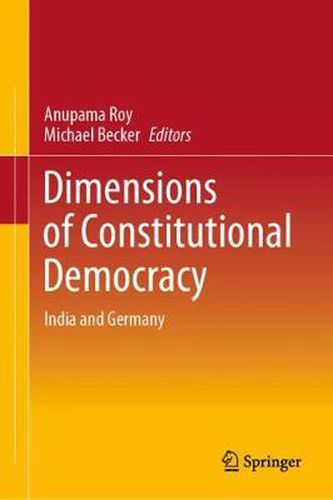Readings Newsletter
Become a Readings Member to make your shopping experience even easier.
Sign in or sign up for free!
You’re not far away from qualifying for FREE standard shipping within Australia
You’ve qualified for FREE standard shipping within Australia
The cart is loading…






This title is printed to order. This book may have been self-published. If so, we cannot guarantee the quality of the content. In the main most books will have gone through the editing process however some may not. We therefore suggest that you be aware of this before ordering this book. If in doubt check either the author or publisher’s details as we are unable to accept any returns unless they are faulty. Please contact us if you have any questions.
This book examines a selection of themes that have become salient in contemporary debates on constitutional democracies. It focuses in particular on the experiences of India and Germany as examples of post-war and post-colonial constitutional democracies whose trajectories illustrate democratic transitions and transformative constitutionalism. While transformative constitutionalism has come to be associated specifically with the post-apartheid experience in South Africa, this book uses the transformative as an analytical framework to transcend the dichotomy of west and east and explore how temporally coincident constitutions have sought to install constitutional democracies by breaking with the past. While the constitution-making processes in the two countries were specific to their political contexts, the constitutional promises and futures converged.
In this context, the book explores the themes of Constitutionalism, Nationalism, Secularism, Sovereignty and Rule of Law, Freedoms and Rights, to investigate how the contestations over democratic transitions and democratic futures have unfolded in the two democracies. It offers readers valuable insights into how the normative frameworks of constitutional democracy take concrete form at specific sites of democratic and constitutional imagination in Dalit and Islamic writings, as well as the relationship between state and religion in the writings of public intellectuals, political and legal philosophers. The book also focuses on specific sites of contestation in democracies including the relationship between sovereignty and citizenship in post-colonial India, free speech and sedition in liberal democracies, questions of land rights in connection with economic and political changes in contemporary contexts, and the rights of indigenous communities with regard to international conventions and domestic law. Given its scope, it will be of interest to students and scholars of political theory, political philosophy, comparative constitutionalism, law and human rights.
$9.00 standard shipping within Australia
FREE standard shipping within Australia for orders over $100.00
Express & International shipping calculated at checkout
This title is printed to order. This book may have been self-published. If so, we cannot guarantee the quality of the content. In the main most books will have gone through the editing process however some may not. We therefore suggest that you be aware of this before ordering this book. If in doubt check either the author or publisher’s details as we are unable to accept any returns unless they are faulty. Please contact us if you have any questions.
This book examines a selection of themes that have become salient in contemporary debates on constitutional democracies. It focuses in particular on the experiences of India and Germany as examples of post-war and post-colonial constitutional democracies whose trajectories illustrate democratic transitions and transformative constitutionalism. While transformative constitutionalism has come to be associated specifically with the post-apartheid experience in South Africa, this book uses the transformative as an analytical framework to transcend the dichotomy of west and east and explore how temporally coincident constitutions have sought to install constitutional democracies by breaking with the past. While the constitution-making processes in the two countries were specific to their political contexts, the constitutional promises and futures converged.
In this context, the book explores the themes of Constitutionalism, Nationalism, Secularism, Sovereignty and Rule of Law, Freedoms and Rights, to investigate how the contestations over democratic transitions and democratic futures have unfolded in the two democracies. It offers readers valuable insights into how the normative frameworks of constitutional democracy take concrete form at specific sites of democratic and constitutional imagination in Dalit and Islamic writings, as well as the relationship between state and religion in the writings of public intellectuals, political and legal philosophers. The book also focuses on specific sites of contestation in democracies including the relationship between sovereignty and citizenship in post-colonial India, free speech and sedition in liberal democracies, questions of land rights in connection with economic and political changes in contemporary contexts, and the rights of indigenous communities with regard to international conventions and domestic law. Given its scope, it will be of interest to students and scholars of political theory, political philosophy, comparative constitutionalism, law and human rights.